Accounting Project Report: Analysis, Transactions, and Ethics
VerifiedAdded on 2021/04/21
|8
|1448
|145
Project
AI Summary
This project report analyzes accounting principles through several key questions. It begins by classifying various account types, including assets, liabilities, owner's equity, revenue, and expenses, providing examples for each. The report then analyzes a balance sheet, identifying the owner, owner's investment, amounts owed by and to customers and suppliers, inventory, and a secured loan. Next, the report presents a transaction analysis, detailing debits and credits for various financial events. The report also explores accounting ethics, discussing integrity, objectivity, confidentiality, professional competence, and professional behavior. Finally, the report includes a reverse engineering analysis of transactions. The report concludes with a list of references.
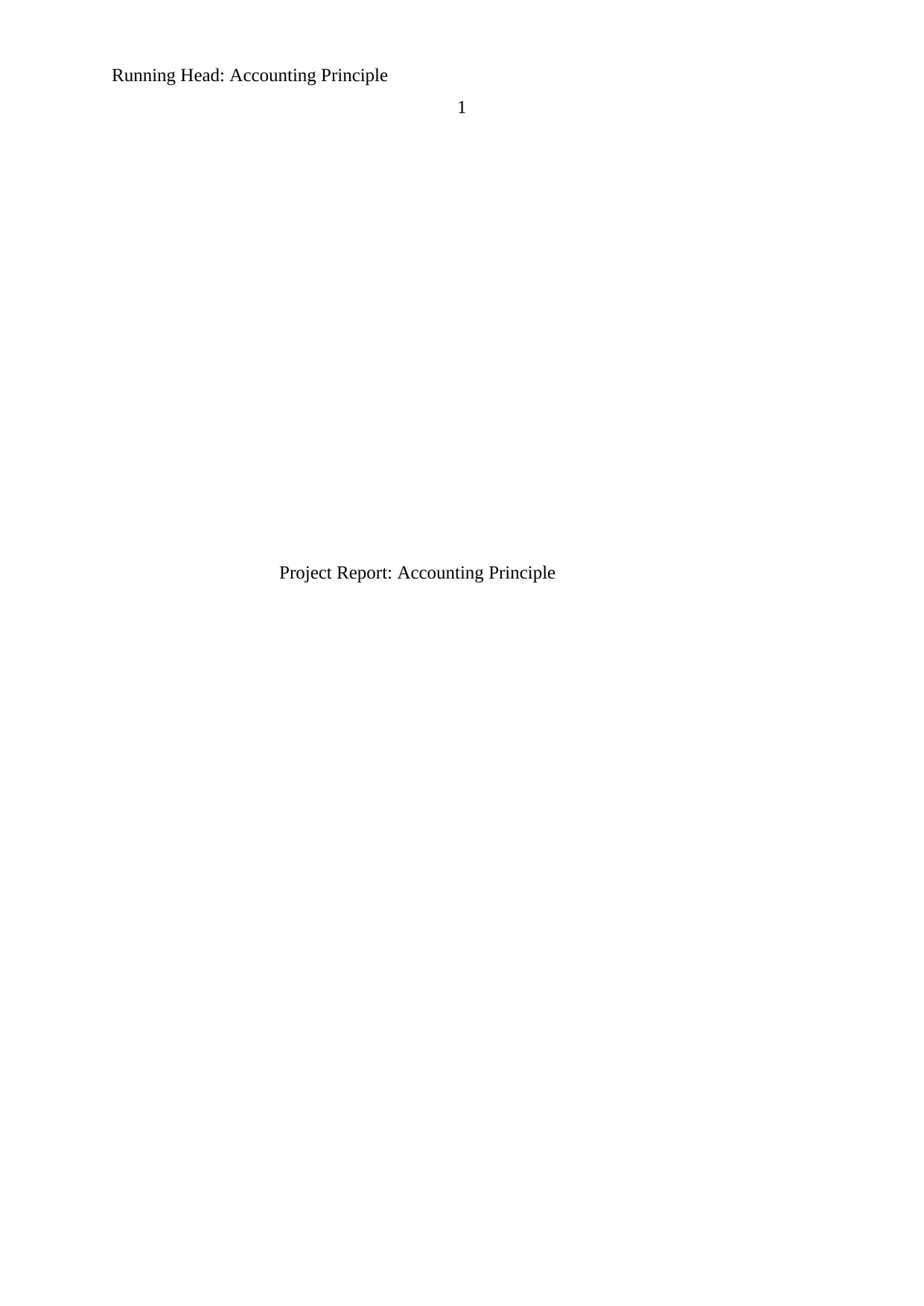
Running Head: Accounting Principle
1
Project Report: Accounting Principle
1
Project Report: Accounting Principle
Paraphrase This Document
Need a fresh take? Get an instant paraphrase of this document with our AI Paraphraser
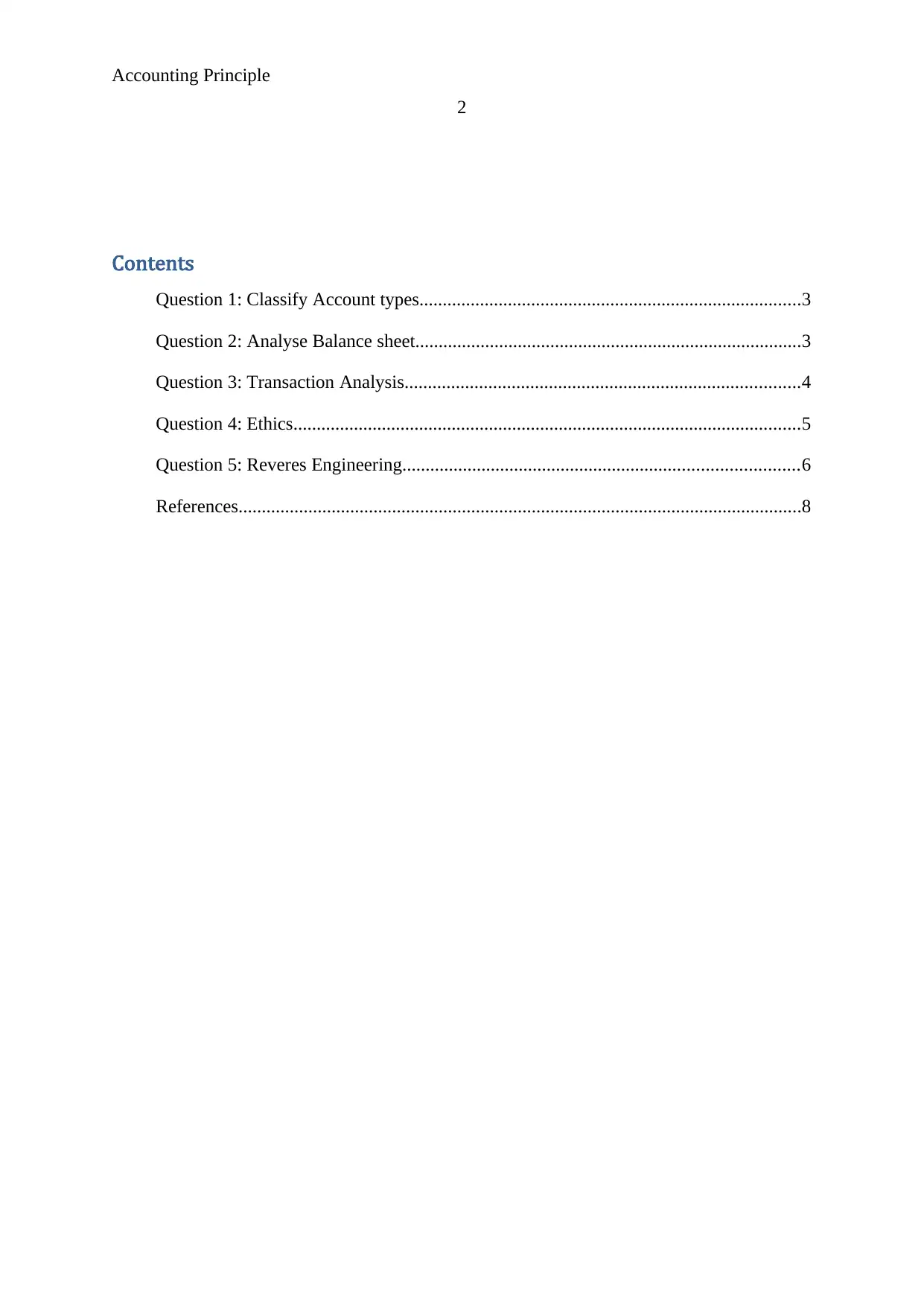
Accounting Principle
2
Contents
Question 1: Classify Account types..................................................................................3
Question 2: Analyse Balance sheet...................................................................................3
Question 3: Transaction Analysis.....................................................................................4
Question 4: Ethics.............................................................................................................5
Question 5: Reveres Engineering.....................................................................................6
References.........................................................................................................................8
2
Contents
Question 1: Classify Account types..................................................................................3
Question 2: Analyse Balance sheet...................................................................................3
Question 3: Transaction Analysis.....................................................................................4
Question 4: Ethics.............................................................................................................5
Question 5: Reveres Engineering.....................................................................................6
References.........................................................................................................................8
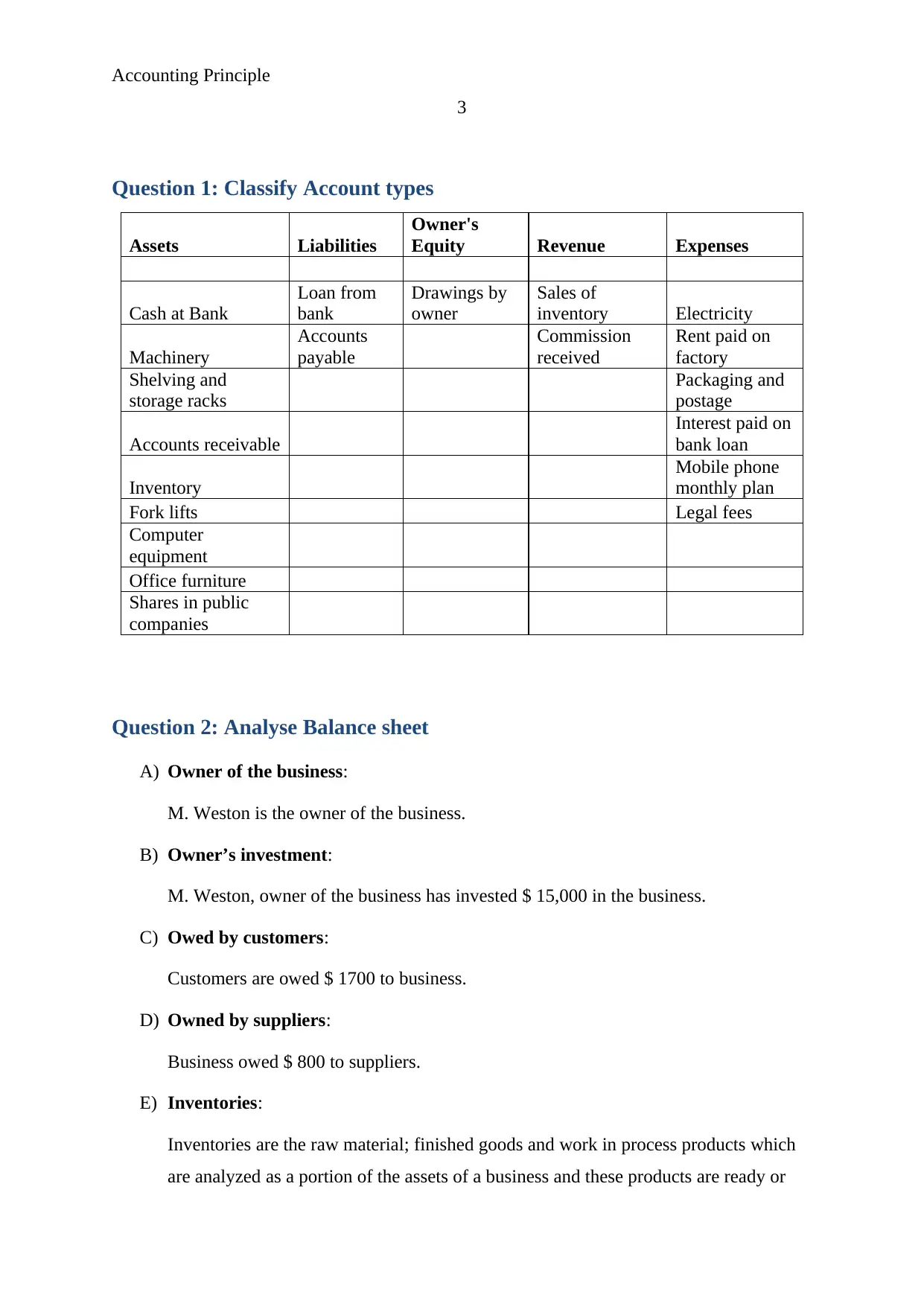
Accounting Principle
3
Question 1: Classify Account types
Assets Liabilities
Owner's
Equity Revenue Expenses
Cash at Bank
Loan from
bank
Drawings by
owner
Sales of
inventory Electricity
Machinery
Accounts
payable
Commission
received
Rent paid on
factory
Shelving and
storage racks
Packaging and
postage
Accounts receivable
Interest paid on
bank loan
Inventory
Mobile phone
monthly plan
Fork lifts Legal fees
Computer
equipment
Office furniture
Shares in public
companies
Question 2: Analyse Balance sheet
A) Owner of the business:
M. Weston is the owner of the business.
B) Owner’s investment:
M. Weston, owner of the business has invested $ 15,000 in the business.
C) Owed by customers:
Customers are owed $ 1700 to business.
D) Owned by suppliers:
Business owed $ 800 to suppliers.
E) Inventories:
Inventories are the raw material; finished goods and work in process products which
are analyzed as a portion of the assets of a business and these products are ready or
3
Question 1: Classify Account types
Assets Liabilities
Owner's
Equity Revenue Expenses
Cash at Bank
Loan from
bank
Drawings by
owner
Sales of
inventory Electricity
Machinery
Accounts
payable
Commission
received
Rent paid on
factory
Shelving and
storage racks
Packaging and
postage
Accounts receivable
Interest paid on
bank loan
Inventory
Mobile phone
monthly plan
Fork lifts Legal fees
Computer
equipment
Office furniture
Shares in public
companies
Question 2: Analyse Balance sheet
A) Owner of the business:
M. Weston is the owner of the business.
B) Owner’s investment:
M. Weston, owner of the business has invested $ 15,000 in the business.
C) Owed by customers:
Customers are owed $ 1700 to business.
D) Owned by suppliers:
Business owed $ 800 to suppliers.
E) Inventories:
Inventories are the raw material; finished goods and work in process products which
are analyzed as a portion of the assets of a business and these products are ready or
⊘ This is a preview!⊘
Do you want full access?
Subscribe today to unlock all pages.

Trusted by 1+ million students worldwide
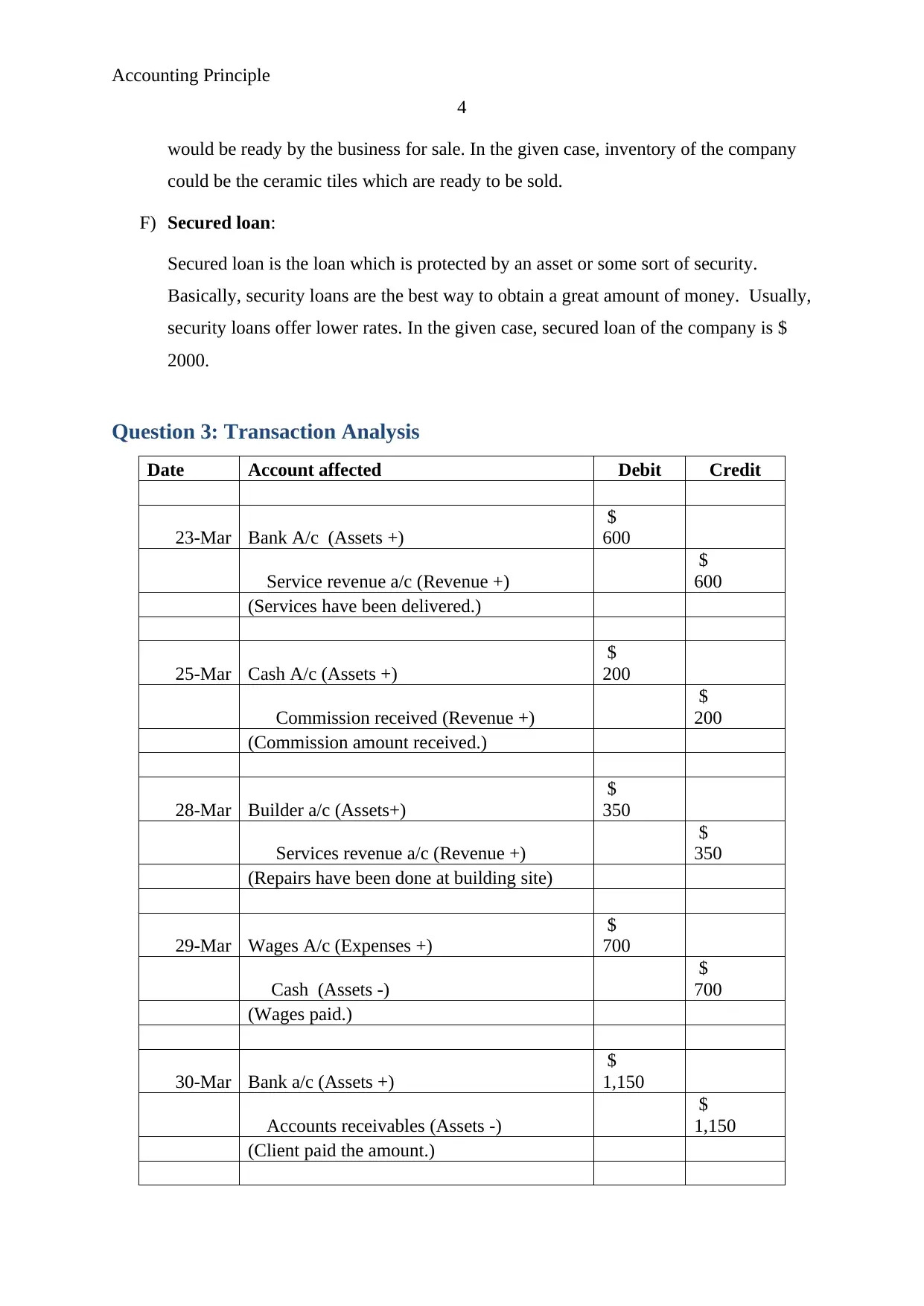
Accounting Principle
4
would be ready by the business for sale. In the given case, inventory of the company
could be the ceramic tiles which are ready to be sold.
F) Secured loan:
Secured loan is the loan which is protected by an asset or some sort of security.
Basically, security loans are the best way to obtain a great amount of money. Usually,
security loans offer lower rates. In the given case, secured loan of the company is $
2000.
Question 3: Transaction Analysis
Date Account affected Debit Credit
23-Mar Bank A/c (Assets +)
$
600
Service revenue a/c (Revenue +)
$
600
(Services have been delivered.)
25-Mar Cash A/c (Assets +)
$
200
Commission received (Revenue +)
$
200
(Commission amount received.)
28-Mar Builder a/c (Assets+)
$
350
Services revenue a/c (Revenue +)
$
350
(Repairs have been done at building site)
29-Mar Wages A/c (Expenses +)
$
700
Cash (Assets -)
$
700
(Wages paid.)
30-Mar Bank a/c (Assets +)
$
1,150
Accounts receivables (Assets -)
$
1,150
(Client paid the amount.)
4
would be ready by the business for sale. In the given case, inventory of the company
could be the ceramic tiles which are ready to be sold.
F) Secured loan:
Secured loan is the loan which is protected by an asset or some sort of security.
Basically, security loans are the best way to obtain a great amount of money. Usually,
security loans offer lower rates. In the given case, secured loan of the company is $
2000.
Question 3: Transaction Analysis
Date Account affected Debit Credit
23-Mar Bank A/c (Assets +)
$
600
Service revenue a/c (Revenue +)
$
600
(Services have been delivered.)
25-Mar Cash A/c (Assets +)
$
200
Commission received (Revenue +)
$
200
(Commission amount received.)
28-Mar Builder a/c (Assets+)
$
350
Services revenue a/c (Revenue +)
$
350
(Repairs have been done at building site)
29-Mar Wages A/c (Expenses +)
$
700
Cash (Assets -)
$
700
(Wages paid.)
30-Mar Bank a/c (Assets +)
$
1,150
Accounts receivables (Assets -)
$
1,150
(Client paid the amount.)
Paraphrase This Document
Need a fresh take? Get an instant paraphrase of this document with our AI Paraphraser
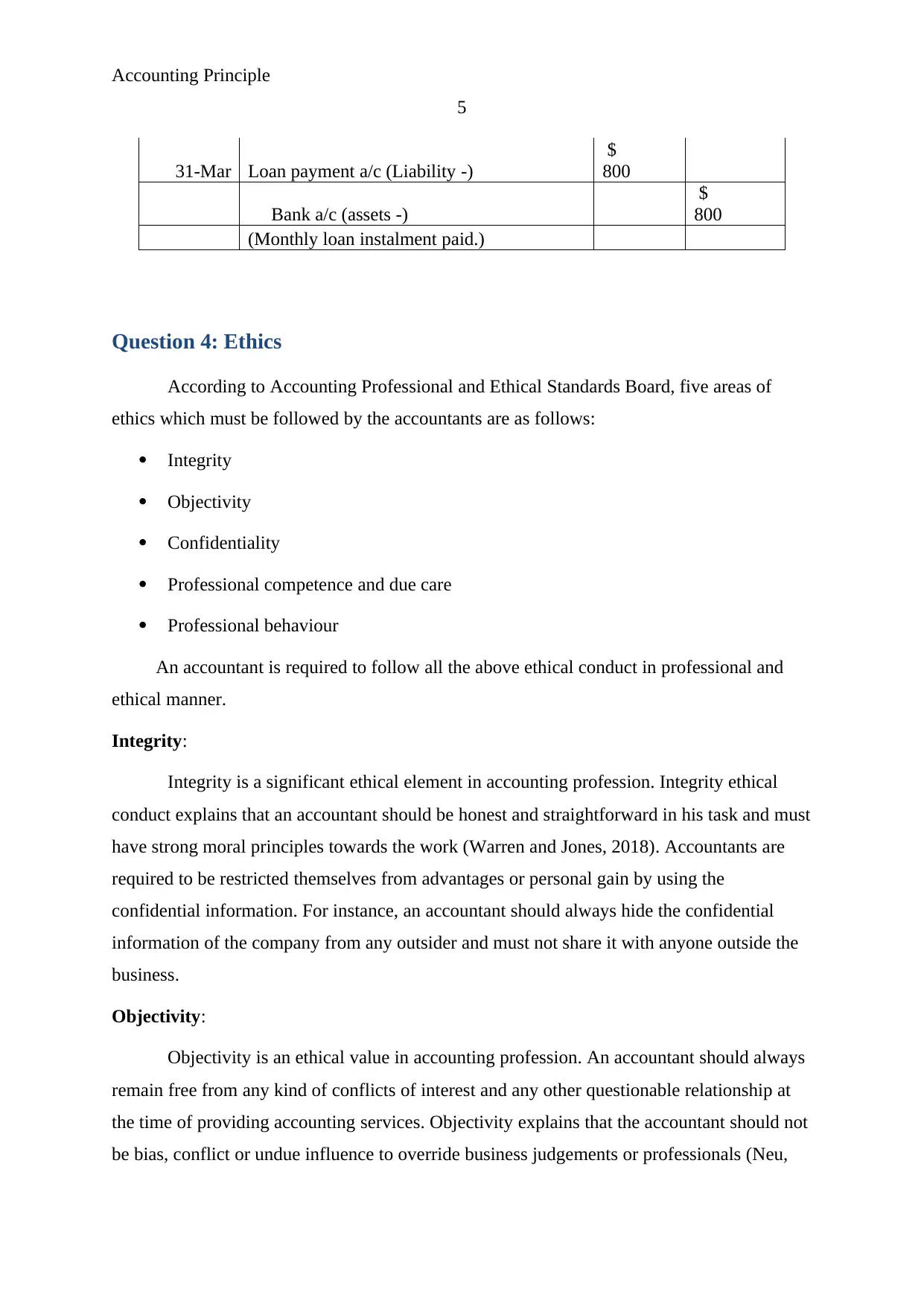
Accounting Principle
5
31-Mar Loan payment a/c (Liability -)
$
800
Bank a/c (assets -)
$
800
(Monthly loan instalment paid.)
Question 4: Ethics
According to Accounting Professional and Ethical Standards Board, five areas of
ethics which must be followed by the accountants are as follows:
Integrity
Objectivity
Confidentiality
Professional competence and due care
Professional behaviour
An accountant is required to follow all the above ethical conduct in professional and
ethical manner.
Integrity:
Integrity is a significant ethical element in accounting profession. Integrity ethical
conduct explains that an accountant should be honest and straightforward in his task and must
have strong moral principles towards the work (Warren and Jones, 2018). Accountants are
required to be restricted themselves from advantages or personal gain by using the
confidential information. For instance, an accountant should always hide the confidential
information of the company from any outsider and must not share it with anyone outside the
business.
Objectivity:
Objectivity is an ethical value in accounting profession. An accountant should always
remain free from any kind of conflicts of interest and any other questionable relationship at
the time of providing accounting services. Objectivity explains that the accountant should not
be bias, conflict or undue influence to override business judgements or professionals (Neu,
5
31-Mar Loan payment a/c (Liability -)
$
800
Bank a/c (assets -)
$
800
(Monthly loan instalment paid.)
Question 4: Ethics
According to Accounting Professional and Ethical Standards Board, five areas of
ethics which must be followed by the accountants are as follows:
Integrity
Objectivity
Confidentiality
Professional competence and due care
Professional behaviour
An accountant is required to follow all the above ethical conduct in professional and
ethical manner.
Integrity:
Integrity is a significant ethical element in accounting profession. Integrity ethical
conduct explains that an accountant should be honest and straightforward in his task and must
have strong moral principles towards the work (Warren and Jones, 2018). Accountants are
required to be restricted themselves from advantages or personal gain by using the
confidential information. For instance, an accountant should always hide the confidential
information of the company from any outsider and must not share it with anyone outside the
business.
Objectivity:
Objectivity is an ethical value in accounting profession. An accountant should always
remain free from any kind of conflicts of interest and any other questionable relationship at
the time of providing accounting services. Objectivity explains that the accountant should not
be bias, conflict or undue influence to override business judgements or professionals (Neu,
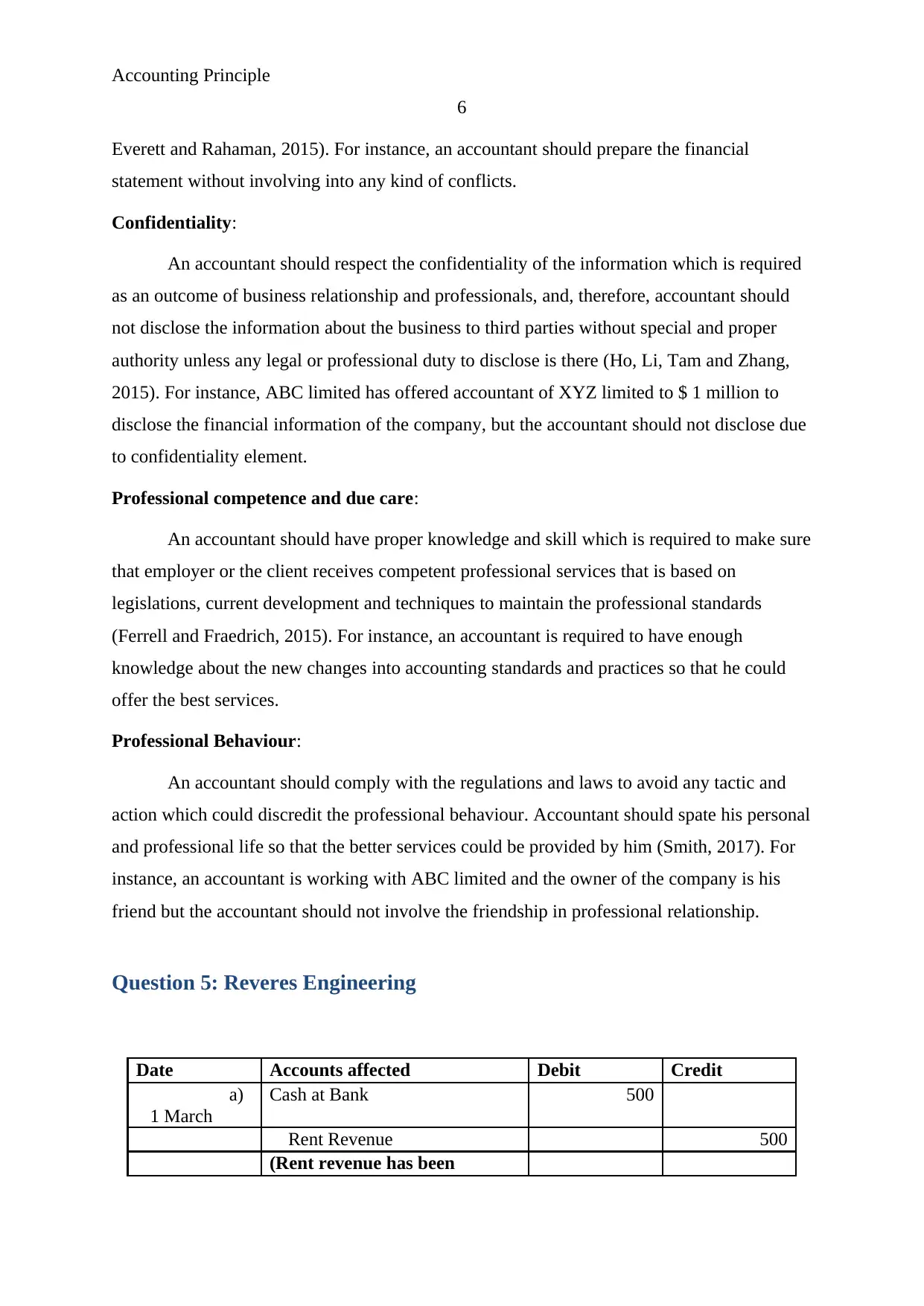
Accounting Principle
6
Everett and Rahaman, 2015). For instance, an accountant should prepare the financial
statement without involving into any kind of conflicts.
Confidentiality:
An accountant should respect the confidentiality of the information which is required
as an outcome of business relationship and professionals, and, therefore, accountant should
not disclose the information about the business to third parties without special and proper
authority unless any legal or professional duty to disclose is there (Ho, Li, Tam and Zhang,
2015). For instance, ABC limited has offered accountant of XYZ limited to $ 1 million to
disclose the financial information of the company, but the accountant should not disclose due
to confidentiality element.
Professional competence and due care:
An accountant should have proper knowledge and skill which is required to make sure
that employer or the client receives competent professional services that is based on
legislations, current development and techniques to maintain the professional standards
(Ferrell and Fraedrich, 2015). For instance, an accountant is required to have enough
knowledge about the new changes into accounting standards and practices so that he could
offer the best services.
Professional Behaviour:
An accountant should comply with the regulations and laws to avoid any tactic and
action which could discredit the professional behaviour. Accountant should spate his personal
and professional life so that the better services could be provided by him (Smith, 2017). For
instance, an accountant is working with ABC limited and the owner of the company is his
friend but the accountant should not involve the friendship in professional relationship.
Question 5: Reveres Engineering
Date Accounts affected Debit Credit
a)
1 March
Cash at Bank 500
Rent Revenue 500
(Rent revenue has been
6
Everett and Rahaman, 2015). For instance, an accountant should prepare the financial
statement without involving into any kind of conflicts.
Confidentiality:
An accountant should respect the confidentiality of the information which is required
as an outcome of business relationship and professionals, and, therefore, accountant should
not disclose the information about the business to third parties without special and proper
authority unless any legal or professional duty to disclose is there (Ho, Li, Tam and Zhang,
2015). For instance, ABC limited has offered accountant of XYZ limited to $ 1 million to
disclose the financial information of the company, but the accountant should not disclose due
to confidentiality element.
Professional competence and due care:
An accountant should have proper knowledge and skill which is required to make sure
that employer or the client receives competent professional services that is based on
legislations, current development and techniques to maintain the professional standards
(Ferrell and Fraedrich, 2015). For instance, an accountant is required to have enough
knowledge about the new changes into accounting standards and practices so that he could
offer the best services.
Professional Behaviour:
An accountant should comply with the regulations and laws to avoid any tactic and
action which could discredit the professional behaviour. Accountant should spate his personal
and professional life so that the better services could be provided by him (Smith, 2017). For
instance, an accountant is working with ABC limited and the owner of the company is his
friend but the accountant should not involve the friendship in professional relationship.
Question 5: Reveres Engineering
Date Accounts affected Debit Credit
a)
1 March
Cash at Bank 500
Rent Revenue 500
(Rent revenue has been
⊘ This is a preview!⊘
Do you want full access?
Subscribe today to unlock all pages.

Trusted by 1+ million students worldwide
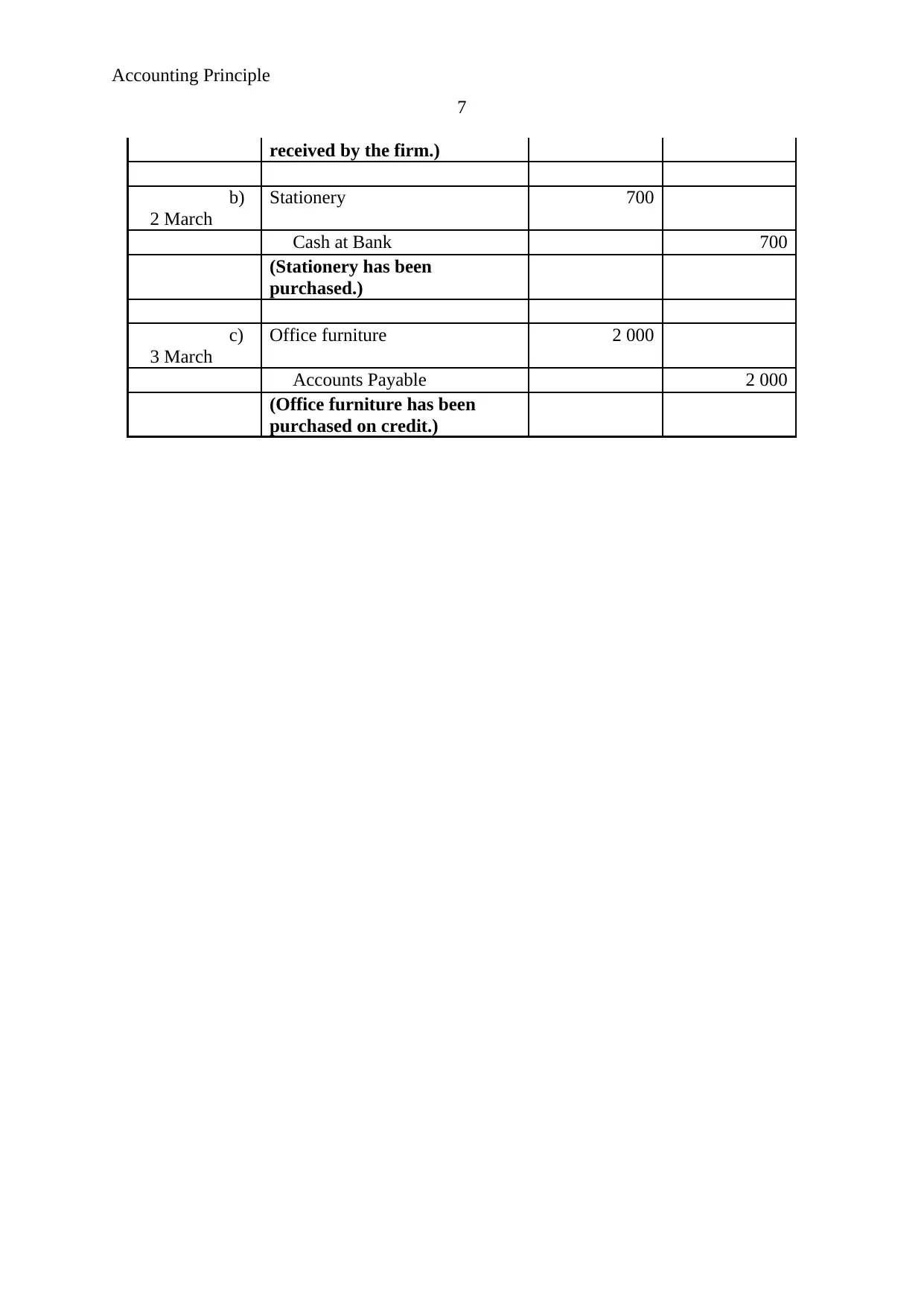
Accounting Principle
7
received by the firm.)
b)
2 March
Stationery 700
Cash at Bank 700
(Stationery has been
purchased.)
c)
3 March
Office furniture 2 000
Accounts Payable 2 000
(Office furniture has been
purchased on credit.)
7
received by the firm.)
b)
2 March
Stationery 700
Cash at Bank 700
(Stationery has been
purchased.)
c)
3 March
Office furniture 2 000
Accounts Payable 2 000
(Office furniture has been
purchased on credit.)
Paraphrase This Document
Need a fresh take? Get an instant paraphrase of this document with our AI Paraphraser
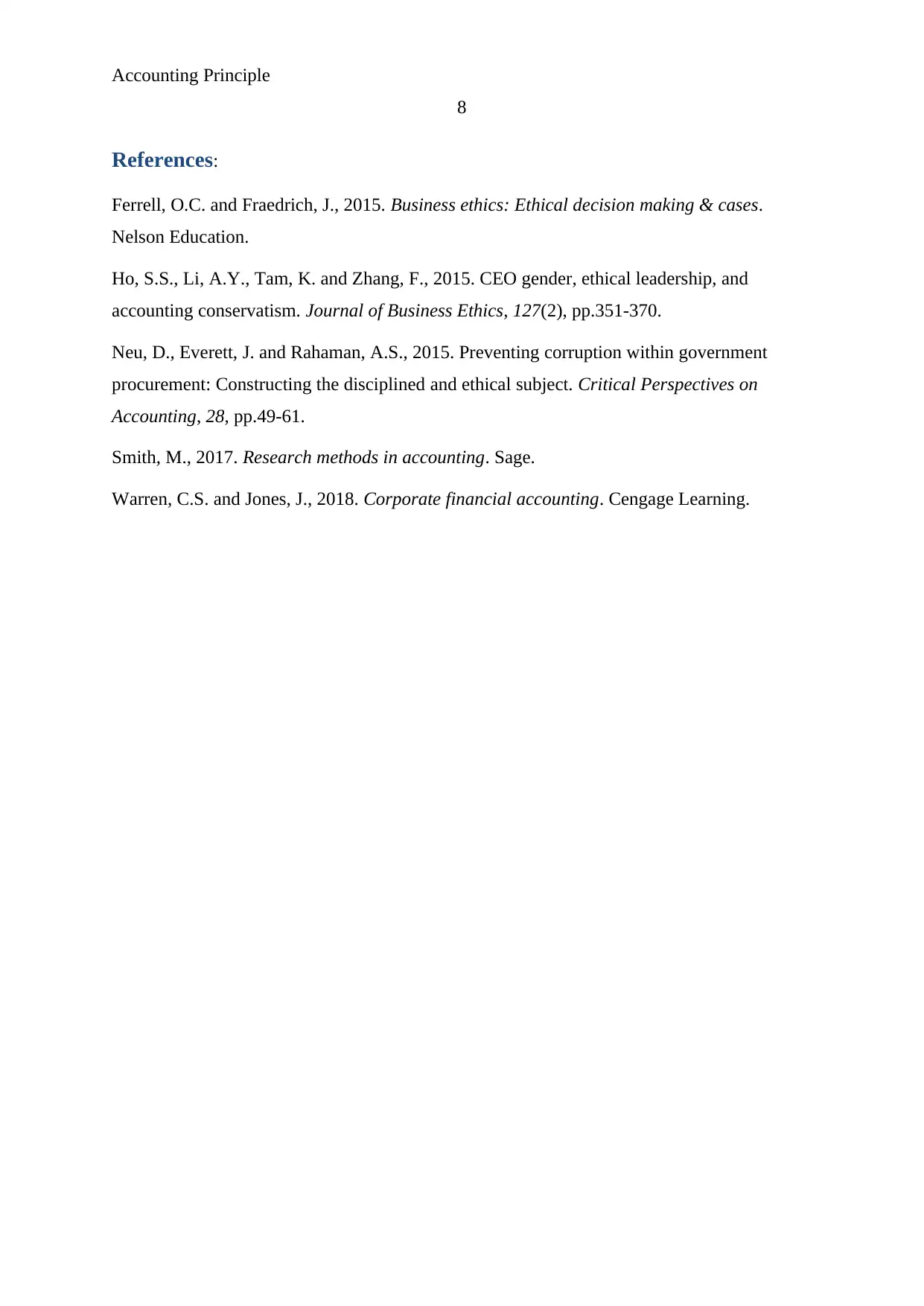
Accounting Principle
8
References:
Ferrell, O.C. and Fraedrich, J., 2015. Business ethics: Ethical decision making & cases.
Nelson Education.
Ho, S.S., Li, A.Y., Tam, K. and Zhang, F., 2015. CEO gender, ethical leadership, and
accounting conservatism. Journal of Business Ethics, 127(2), pp.351-370.
Neu, D., Everett, J. and Rahaman, A.S., 2015. Preventing corruption within government
procurement: Constructing the disciplined and ethical subject. Critical Perspectives on
Accounting, 28, pp.49-61.
Smith, M., 2017. Research methods in accounting. Sage.
Warren, C.S. and Jones, J., 2018. Corporate financial accounting. Cengage Learning.
8
References:
Ferrell, O.C. and Fraedrich, J., 2015. Business ethics: Ethical decision making & cases.
Nelson Education.
Ho, S.S., Li, A.Y., Tam, K. and Zhang, F., 2015. CEO gender, ethical leadership, and
accounting conservatism. Journal of Business Ethics, 127(2), pp.351-370.
Neu, D., Everett, J. and Rahaman, A.S., 2015. Preventing corruption within government
procurement: Constructing the disciplined and ethical subject. Critical Perspectives on
Accounting, 28, pp.49-61.
Smith, M., 2017. Research methods in accounting. Sage.
Warren, C.S. and Jones, J., 2018. Corporate financial accounting. Cengage Learning.
1 out of 8
Related Documents
Your All-in-One AI-Powered Toolkit for Academic Success.
+13062052269
info@desklib.com
Available 24*7 on WhatsApp / Email
![[object Object]](/_next/static/media/star-bottom.7253800d.svg)
Unlock your academic potential
Copyright © 2020–2026 A2Z Services. All Rights Reserved. Developed and managed by ZUCOL.





